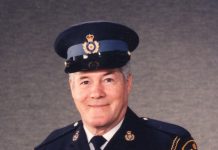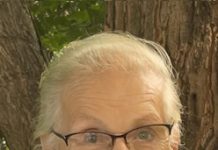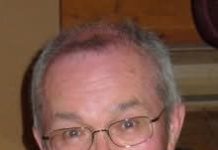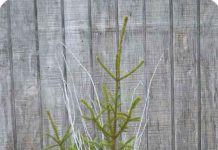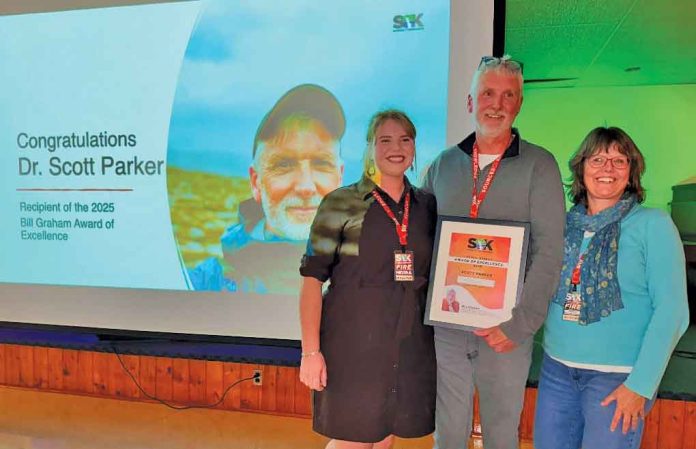
Submitted by Moira Parker, Sources of Knowledge
A sold-out audience filled venues across Tobermory on October 24-26 for Sources of Knowledge: Fire – Respect, Knowledge, Balance. Over three days the Forum combined science, Indigenous perspectives, and local experience into one conversation: how we can understand, and live with, fire.
The weekend was ignited beside a sacred fire kept by Saugeen Ojibway Nation firekeeper Lloyd Ritchie. Opening prayers and teachings from Elders David and Ellen Root and Renita Nawash framed fire as relationship between earth, water, and people. From there, Dr. Michael Chazan (University of Toronto) carried the story to South Africa’s Wonderwerk Cave, where his team used thin-section microscopy to identify ash in the deposits – evidence consistent with fire being brought in by early hominins, likely Homo erectus. “Fire is a story of millions of years of interactions,” he said, reminding us that fire is social and necessary, a technology and a mystery, present in spiritual traditions and seasonal rhythms as much as in science.
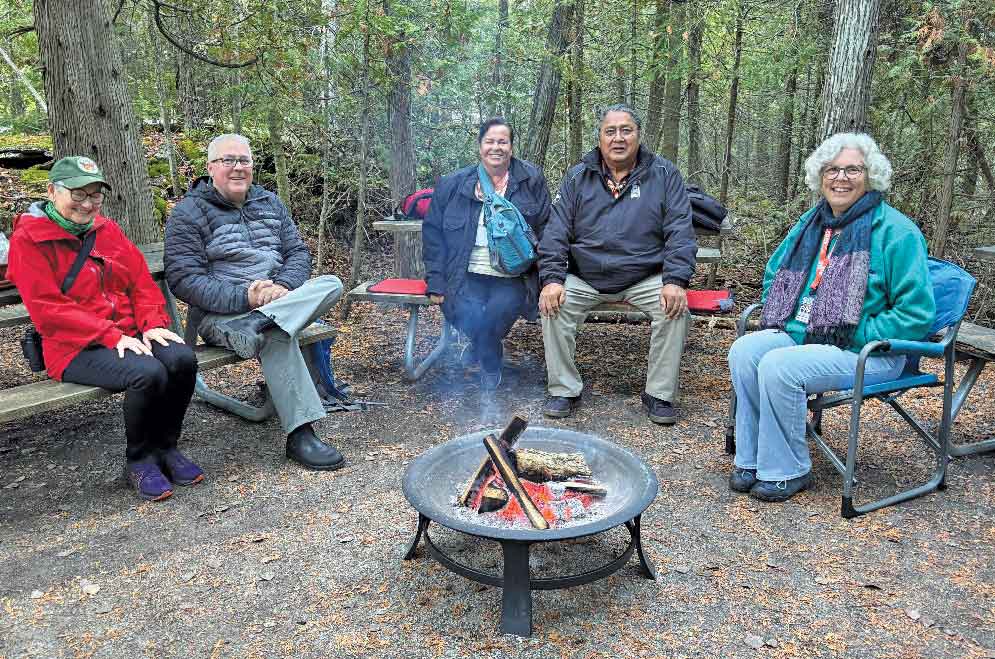
Saturday turned to the local picture. Sean Liipere (Parks Canada) traced the Peninsula’s fire history and ecology: a Great Lakes transition zone with globally rare alvar habitats; fire-adapted species, from birch suckering after burn to jack pine’s serotinous cones; and a legacy of 19th–20th-century land use that reset natural fire regimes. The suppression era changed age structure and species composition. Today much of the forest is roughly 100–125 years old, with white cedar widespread.
His message was hopeful, we are shifting from suppression to co-existence, guided by coordinated effort, better data, and responsible management.
Adding a national lens, Natasha Jurko (Canadian Forest Service) outlined Canada-wide patterns – about 8,000 fires annually (roughly 45% lightning, 55% human-caused) and 2+ million hectares burned on average per year – and showed how the Canadian Wildland Fire Information System is used as a monitoring system to inform day-to-day and seasonal planning.
Provincial, municipal, and park-specific initiatives rounded out the afternoon. Acting Superintendent Ethan Meleg (Parks Canada) walked through the Park’s methods of fire prevention, reduction, preparedness, mitigation, response, and education. He emphasized fire-safe practices (e.g., campfires only within Cyprus Lake Campground under set conditions, timely fire bans, and mulching brush rather than leaving deadwood), the Parks Canada dispatch line, and the importance of working together when conditions tighten.
Fire Chief Jack Burt (Municipality of Northern Bruce Peninsula) made us question if we were truly prepared for a fire, encouraging a 72-hour household kit, FireSmart-style property maintenance, and clear teamwork and communication: “we are truly stronger together as a team.”
Kennith Cox (Ministry of Natural Resources) focused on the province’s fire mitigation and resiliency, explaining how wildfires ignite and spread, which ecosystems are more prone to burn, and how Ontario deploys resources locally, nationally, and internationally.
Deputy Mayor Rod Anderson spoke on hard realities – recruiting and retaining volunteer firefighters, statutory obligations under provincial law, and Council’s duty to make balanced, transparent decisions with limited resources. Recent tabletop exercises, he noted, have been “eye-opening,” and he expressed confidence in the direction of local preparedness under Chief Burt’s training program.
Thomas Heinrich (University of Sherbrooke) closed the daytime program with “Growing Old Growth: Restoring Disturbance.” His argument was clear: old growth is not only old trees; it’s old processes. Long-lived forests are built by variation – irregular canopy gaps, layered structure, snags and coarse woody debris – features created by natural disturbances like low- to mixed-severity fire, windthrow, and ice. On a Peninsula shaped by a century of suppression and even-aged stands, Heinrich suggested carefully re-introducing disturbance, so forests regain the diversity that helps them withstand heat, drought, disease, and invasive species while reducing extreme fire risk over time.
Saturday evening’s banquet at the Community Centre welcomed attendees with a social hour emceed by Ethan Meleg and a wonderful meal catered by Pharos at the Princess Hotel. Moira Parker presented the 2025 Bill Graham Award of Excellence to her father, Dr. Scott Parker, honouring decades of leadership in ecosystem science, teaching, community service, and his foundational role in Sources of Knowledge. Natasha Jurko then returned for the keynote, “Canada’s Wildfire Watch,” showing how advances in danger rating, monitoring, and seasonal outlooks support mitigation, prediction, and community planning – all tools our community can use.
Sunday delivered reflection at the Parks Canada Visitor Centre. Attendees greeted sunrise at the sacred fire, followed by an opening prayer from David Root at 9:00 a.m.
In “Summing Up,” moderated by SOK board member Chris Sumpton, panelists Jack Burt, Ethan Meleg, Rod Anderson, Sean Liipere, Michael Chazan, and Thomas Heinrich offered closing statements and a candid discussion of what they were taking from one another; each said they were leaving with new perspectives. A second session, moderated by Rob Klea, opened the floor for written and live Q&A. Topics ranged from forest regeneration and emergency evacuation to practical suggestions for short-term accommodations.
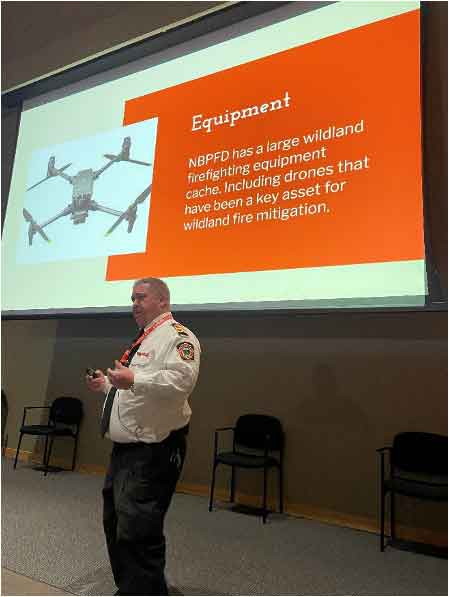
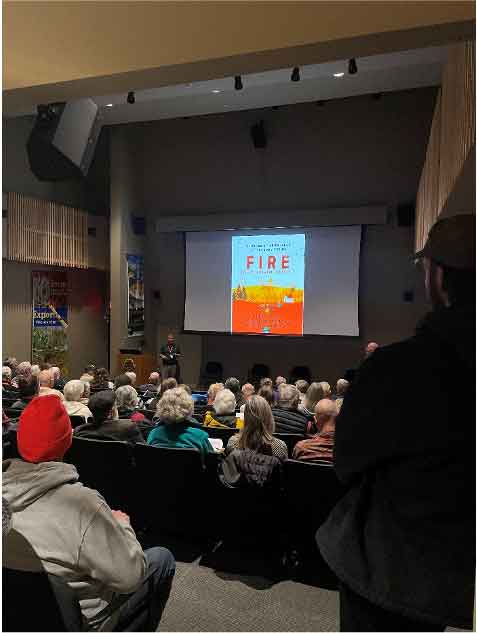
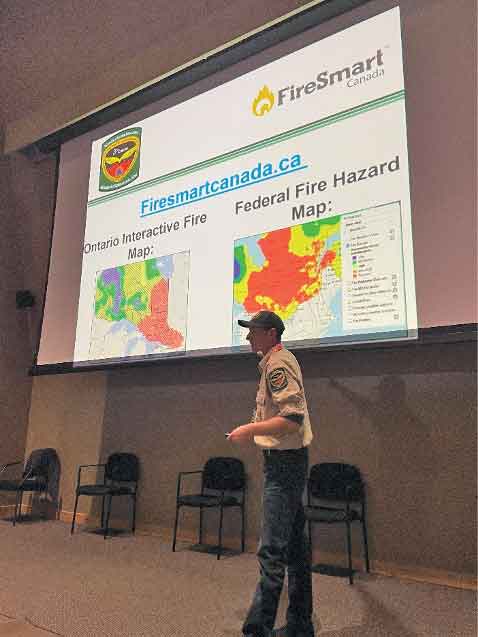
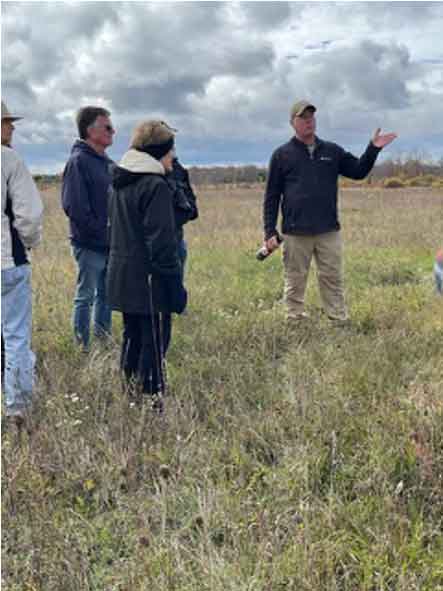
Forum Chair Graham Bland closed with thanks and next steps; SON Elder David Root offered final words; and the weekend ended, fittingly, around the outdoor fire.
The theme for next year’s Forum, Invasive Species, was also announced. This forum will be held May 1 – 3rd, 2026 and we hope to see you all there.
This success was truly shared, and our thanks are many. Miigwetch to the Saugeen Ojibway Nation for teachings and prayers. Thank you to our speakers and panelists; to Parks Canada and the Municipality of Northern Bruce Peninsula for partnership; to the Bruce Trail Conservancy and hike leader Brian Popelier; to the Princess Hotel for catering the banquet; to our volunteers and technical crew (special thanks to Bill and Judy Caulfield-Browne for Friday’s wine and cheese, Hunter Lemon for AV, and Sarah-Jean Hoffman, Claire LaCroix, and Cory Clark for bartending); and to every attendee—your attendance, interest, and questions made the weekend.
If the Forum offered one takeaway, it’s that fire is part of our story—ecologically, culturally, and practically. Living well with it means credible information, respect for place and people, and steady, shared work. To stay involved with upcoming talks, resources, and the 2026 Forum, visit sourcesofknowledge.ca or email info@sourcesofknowledge.ca.
We’re grateful to everyone who helped make Sources of Knowledge 2025 a meaningful, hopeful, and community-made success.



